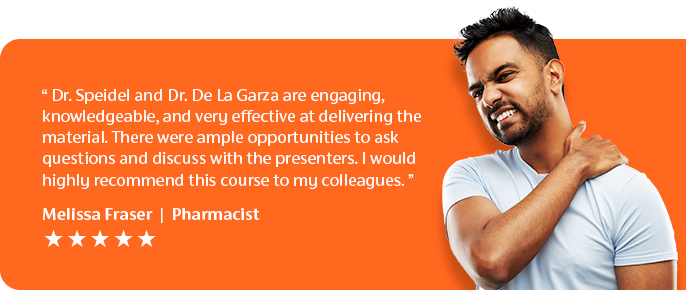
Personalized Analgesic Therapy: Targeting Pain at its Source
Course description
Chronic pain is the primary reason patients seek healthcare, affecting more than 1.5 billion people worldwide, and, despite advances in pain research and knowledge, pain remains inadequately treated. Challenges in current pain management can be described by:
- Adverse systemic side effects, including GI ulcers, liver toxicity, CNS effects, and opioid use disorder
- Inadequate therapeutic efficacy (30-50% of individuals with chronic pain report pain is not adequately controlled)
- Poor patient compliance resulting from adverse side effects and inadequate therapeutic outcomes
- The need for greater understanding by the medical community on how to appropriately target pain pathways
The overarching objective of this program is to address the four major challenges described above:
- Reduce systemic adverse events through topical and local analgesic applications
- Optimize therapeutic outcomes by carefully targeting pain at its source, selecting appropriate analgesics based on pharmacodynamics, and applying appropriate combination therapy
- Improve patient compliance by reducing adverse events, improving outcomes, and simplifying treatment regimens
- Provide healthcare providers the tools to appropriately assess and classify pain, identify anatomical structures and pathways, and appropriately utilize analgesics based on pharmacodynamics, safety, and efficacy profiles – ultimately reducing adverse events, improving outcomes, and reducing opioid use
Collaborate with healthcare providers across the globe with this interactive seminar designed to provide you the practical tools you need to take your pain care to the next level.
The skills and knowledge that is acquired from day one will be put to work on the secnd day with patient case assessments and formula investigations for common pain or pain-related conditions, including osteoarthritis, low back pain, diabetic neuropathy, anal fissures, fibromyalgia, surgical pain, and opioid use disorder.
Bonus! By signing up to this seminar, unlock a one-year subscription, free of charge*, to the new Online Analgesic Therapy Provider Portal, packed with all the valuable content you learn in this program and more. Created as an educational tool for you to share with physicians and other providers this portal presents educational information to support a provider's clinical decision making process when it comes to compounded analgesics - including when compounding is appropriate, efficacy and safety evidence, dosing instructions, how to select a compounding base, how to write a prescription and more. All presented in an easy-to-navigate, easy to digest digital experience.
Course format
Two-day live seminar (16 hours) where you will practically apply your knowledge through case assessments and formula investigations. Leave the live event with a comprehensive manual containing references, charts, and tools that will assist with expanding your practice and optimizing therapeutic outcomes for you patients.
Intended audience
Pharmacists, pharmacy technicians, physicians, nurse practitioners, and other healthcare providers looking to get into or are currently engaged in pain management.
Learning objectives
Pharmacists
- Identify challenges in pain management including adverse systemic reactions, inadequate therapeutic outcomes, poor patient compliance, and the need for education in pain management.
- Classify different types of pain, notably nociceptive pain, neuropathic pain, functional pain, and mixed pain.
- Investigate the neural systems and sensitization processes involved at each level of the pain pathway, including the periphery, the dorsal horn, the ascending pathway, the brain, and the descending pathway.
- Evaluate and organize current evidence on analgesic pharmacology with special focus on pharmacodynamics, efficacy, safety, and dosing of over 40 analgesics.
- Utilize fundamental concepts of topical therapy, including skin anatomy (target layers), physiology (lipids, hydration, temperature, pH, metabolism, and microbiome), individual differences (age, ethnicity, and sensitivities), and formulation consideration (delivery systems, premade base concepts, penetration enhancers, among more).
- Apply skills and knowledge in the form of case assessments and formula investigations for common pain or pain-related conditions.
Pharmacy technicians
- Identify challenges in pain management including adverse systemic reactions, inadequate therapeutic outcomes, poor patient compliance, and the need for education in pain management.
- Classify different types of pain, notably nociceptive pain, neuropathic pain, functional pain, and mixed pain.
- Investigate analgesic targets for pain management.
- Evaluate and organize current evidence on analgesic pharmacology with special focus on pharmacodynamics, efficacy, safety, and dosing of over 40 analgesics.
- Describe important variables for topical therapy application, including skin anatomy (target layers), physiology (lipids, hydration, temperature, pH, metabolism, and microbiome), individual differences (age, ethnicity, and sensitivities), and formulation consideration (delivery systems, premade base concepts, penetration enhancers, among more).
- Assess different case scenarios and critically evaluate formulation treatment options for different patients.
Financial support
This learning activity has received financial support from MEDISCA Inc. in the form of an educational grant.
Copyright
This CE Activity is Copyright © 2008-2024 LP3 Network
*Upon completion of the Analgesic Therapy Seminar registrants will receive an activation code to gain free access to the Analgesic Therapy Provider Portal for a period of one (1) year following registrant's receipt of activation code, regardless of when the portal itself is first accessed. LP3 Network Inc. retains the right to modify or cancel this offering at any time and for any reason. Offering is non-transferable, non-refundable and non-redeemable for monetary value. For more information please speak to an LP3 Network representative.
